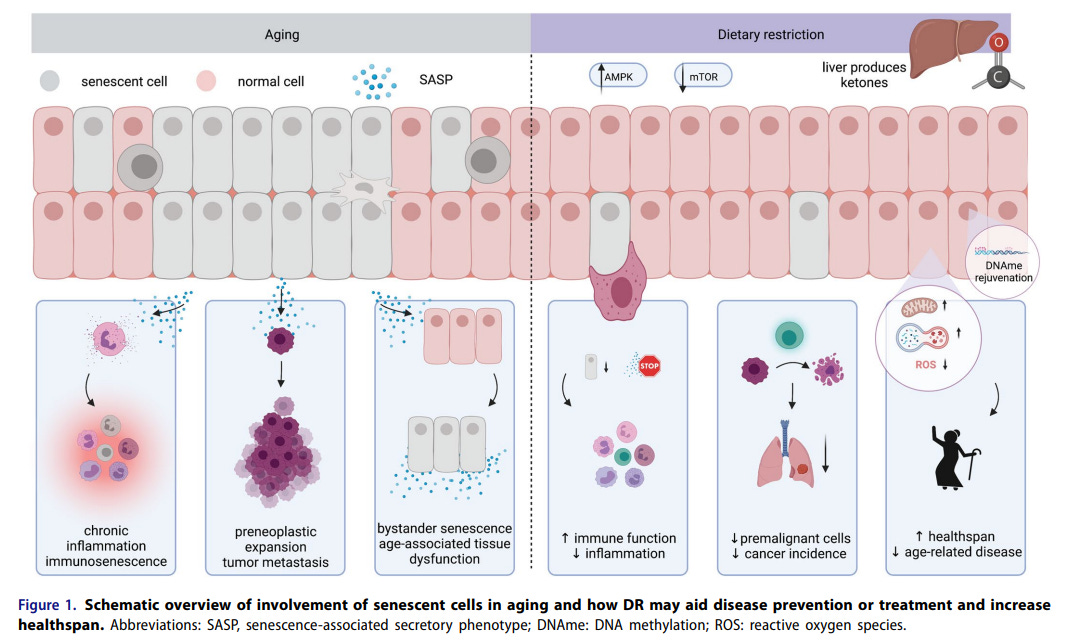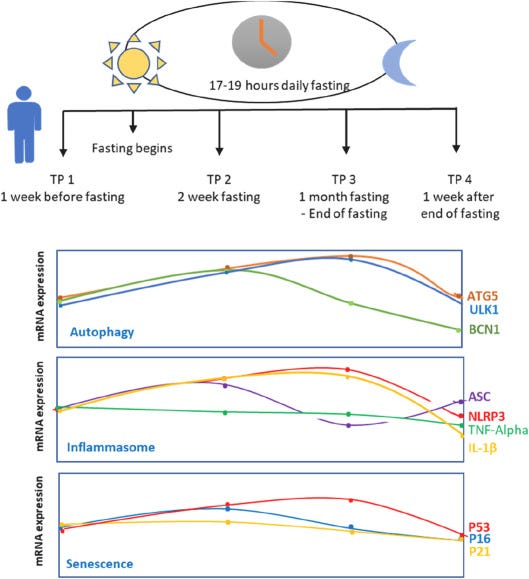Friday Hope: Fasting – Removing Senescent Cells and Reducing ROS
Our greatest weapon against the Spike Protein may just be self-discipline.
The Spike Protein of SARS-CoV-2 induces two phenomena which drive cells, and ultimately organs, into a state resembling the oldest old. These are Senescence and the induction of ROS (Reactive Oxygen Species).
SARS-CoV-2 Spike Protein Induces Paracrine Senescence and Leukocyte Adhesion in Endothelial Cells
https://pubmed.ncbi.nlm.nih.gov/34160250/
A Preliminary Study about the Role of Reactive Oxygen Species and Inflammatory Process after COVID-19 Vaccination and COVID-19 Disease
https://www.mdpi.com/2039-7283/12/4/63
However, we have a therapeutic which is very effective against both phenomena. It is one that is the free and universally accessible. This is the therapeutic of FASTING.
Far from being a cure-all, I believe the evidence demonstrates that adding fasting to a COVID, Long COVID and Spike Protein Injury protocol will prove very effective. Additionally, fasting will also most likely be proven as a prophylactic against COVID and Spike Protein Injury.
Fasting is extremely effective at preventing and removing Senescent cells.
There is increasing evidence that Dietary Restriction (DR) reduces the accumulation of senescent cells and improves healthspan and lifespan. We propose that DR-associated senolysis may be achieved in part via metabolic reprogramming and epigenetic rejuvenation (summary and graphical overview in Figure 1, above). While we welcome the increasing interest in dietary, non-pharmacological approaches in longevity and prevention research, we emphasize the urgent requirement for further research to fully understand both the beneficial and potential harmful effects, including to future generations of offspring, and to further dissect the underlying molecular mechanisms. In particular, many preclinical studies to date have been carried out on male animals only, and more needs to be done to understand the effects of DR in females in relation to sex hormones and their fluctuation.
Dietary restriction in senolysis and prevention and treatment of disease
https://www.tandfonline.com/doi/pdf/10.1080/10408398.2022.2153355
In conclusion, we demonstrated in apparently-healthy males who engaged in a month of Ramadan fasting that prolonged IF may induce autophagy, reduce TNF-α, and reduce senescence markers. Prolonged IF also upregulates the expression of NLRP3, IL1-β, but not ASC, an active inflammasome component. Our study exhibits dynamic changes in autophagy, inflammation, and senescence expressions in a time point manner and how these genes might play a role in the expression level of other pathways. Indeed, further studies are required to understand how IF influences these genes and how every gene affects the others. Since our study was conducted in normal healthy young adults, future cohort studies are needed to elucidate how IF affects overall lifespan and the incidence of diseases.
The effect of prolonged intermittent fasting on autophagy, inflammasome and senescence genes expressions: An exploratory study in healthy young males
https://www.sciencedirect.com/science/article/pii/S2666149723000063
In tandem with the senolytic benefits of fasting, fasting also reduces and inhibits induction of ROS.
Overweight and obese individuals display increased levels of oxidative stress compared to normal weight counterparts. While weight loss can reduce oxidative stress, partial confounding with Caloric Restriction (CR) is likely as CR reduces oxidative stress as well.
One of the greatest benefits of Melatonin regarding COVID and its Spike Protein, is that Melatonin is the NIGHTTIME mitigator of ROS!
Indeed, oxidative stress seems to have a circadian rhythm connection, including circadian oscillations of oxidative stress responses. For example, red blood cells, which do not contain a nucleus, and cannot perform transcription, appear to play a role in circadian regulation of glucose metabolism, which is required to sustain daily redox fluctuations. Moreover, important antioxidants peak in the morning, including glutathione peroxidase, glutathione reductase, catalase, superoxide dismutase, uric acid, and peroxiredoxins. In contrast, melatonin, growth hormone, plasma thiols, lipid peroxidation, ascorbic acid, and period and cytochrome proteins peak in the evening/nighttime.
Impact of intermittent fasting regimens on circulating markers of oxidative stress in overweight and obese humans: A systematic review of randomized controlled trials
https://www.sciencedirect.com/science/article/pii/S2667137921000266
Interestingly, all of these findings dovetail perfectly with what I saw early on, and published a paper on with Carlos Wambier at Brown University.
Could diet and exercise reduce risk of COVID-19 syndemic?
https://www.sciencedirect.com/science/article/pii/S0306987721000207
I am still concerned about reinfections/exposures and long-term metabolic/senescent issues regarding COVID and the Spike Protein. However, for now, I believe fasting to be an important, integral part of COVID/Spike Injury care, and good health in general.
New Study Finds People Who Intermittently Fast Experience Less Severe Complications from COVID-19
https://www.sclhealth.org/news/new-study-finds-people-who-intermittently-fast-experience-less-severe-complications-from-covid-19/



I remember, even before the events of 2020, that fasting has been suggested as a way of resetting the immune system, regenerating immune cells, including stem cells, reducing autoimmunity, activating cancer-killing cells, etc. It is not widely known, but people can fast for quite a long time (weeks and months) on salt and water without any side effects.
On a side note. Thread about the connection between salt intake, electrolyte imbalance, dehydration, humidity, mucosal layers, and respiratory diseases / influenza-like illness (ILI) in winter seasons.
https://twitter.com/B33Mello/status/1446548741981409296
https://threadreaderapp.com/thread/1446548741981409296.html
Fasting and an addition of L. Reuteri yogurt - homemade - is a great strategy.